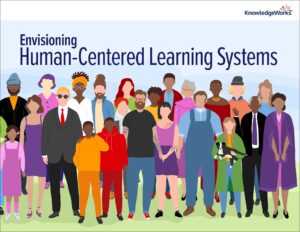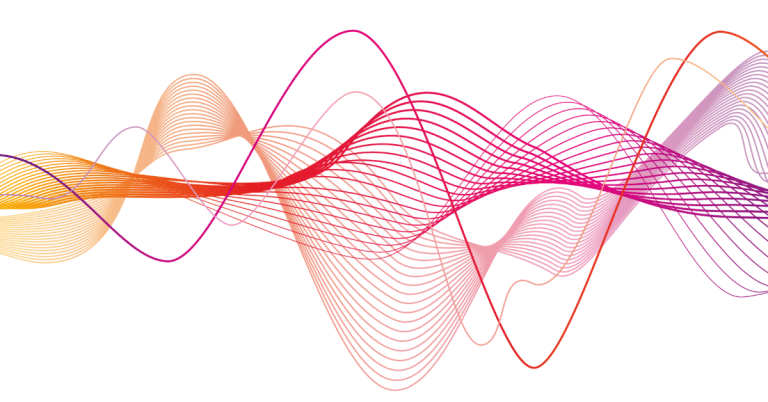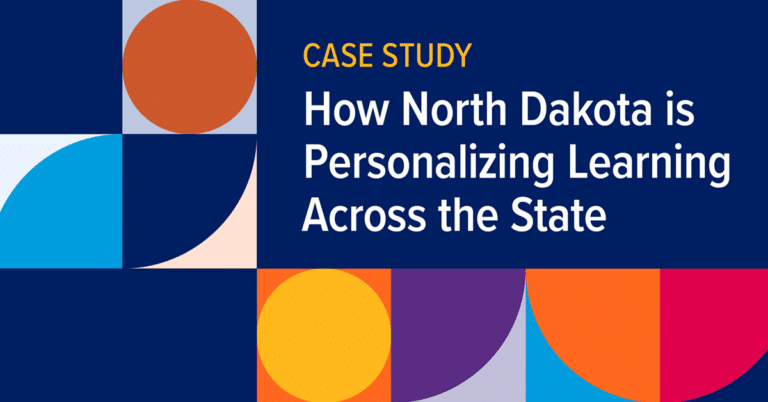A liberatory education system would support each individual so they can develop to their fullest potential and thrive in ways that matter to them. Our newest forecast explores possibilities for liberatory education futures. I recently sat down with Laura Hilger, a director of teaching and learning at KnowledgeWorks with experience leading classrooms, schools and supporting states as they implement and scale personalized, competency-based learning. I wanted to learn from her what she thinks about liberatory education, its potential and how it relates to personalized, competency-based learning.
When you think about liberatory education systems, what comes to mind for you?
Hilger: I think about interconnection. Learning is linked to all other aspects of life. If we were to create a system that was “rooted in self-determination and the right to participate in shaping the world,” all the parts of the system – the people, the policies, the structures, the beliefs, the logistics, the resource allocation and everything else – would all be aligned. They would reinforce the other parts to create a whole community where people know themselves, where they belong and where they are free to forge their own paths.

Belonging is central to human-centered learning systems. Learn more in our publication Envisioning Human-Centered Learning Systems.
Read now >>
What do you think keeps learning communities from working toward a liberatory system? Even people and communities that seem genuinely interested in increasing equity struggle to make deep change.
We all must deeply examine our mindsets and beliefs and unlearn so much of what we think we know, and that is difficult. We are all steeped in norms that are the opposite of reflecting on mindsets and beliefs. The culture in most of education and society is: get moving, get done, don’t stop, make it happen, do more.
We don’t feel like we can slow down, and that keeps us from seeing where we are reinforcing inequity. It keeps us locked into decision-making processes that exclude and marginalize learners, families and community members who are not White, or wealthy, or neurotypical or English-speaking. Communities often say they want to increase equity, but that means grappling with internal values and worldviews and then changing external practices. That takes time that we don’t have built into our systems.
The culture in most of education and society is: get moving, get done, don’t stop, make it happen, do more. We don’t feel like we can slow down, and that keeps us from seeing where we are reinforcing inequity.
What elements of personalized, competency-based learning would support a liberatory system?
Personalized, competency-based learning is grounded in agency. Liberatory systems prioritize potential and promise. When we are nourishing learner agency, we are asking each human to get to know themselves and their voice and how they move through learning.
But we are also asking them to learn how to share their thoughts and to work with others. When you grow your agency, you grow your self-efficacy. When you are given opportunities to do that with others, you begin to grow a community and collective efficacy.
Personalized, competency-based learning cannot happen without putting voice first. People must be able and willing to share their own needs and also release control and power and let others make decisions about things that affect them. And this is at every level. We want to see administrators, teachers, parents, community members and learners who are all confident in their own voices and have space to use them and at the same time trust and believe in and make space for the voices of others. From there, they can together create a system that would work for everyone and for the community as a whole.
What should communities that are pursuing personalized, competency-based learning do to ensure their work is supporting the move toward a liberatory system?
Implementing personalized, competency-based learning without reflecting on the current state of the system is a recipe for building old practices and mindsets into a new-looking system.
More learning communities are performing equity audits, and even more should be doing that. Those types of audits allow communities to unearth where inequities exist in every aspect of the system: transportation, scheduling, grading practices, discipline practices, how adults spend their time. This can support reflection and learning and deepen everyone’s understanding of the true needs of the community and where the current system is falling short.
A lot of times people want to know the new practices and just start, but we have to know where we are and where we have been if we hope to create a different kind of system and a different kind of future.
Because we will never break out of systems, it’s important to examine them to understand and change them. The systems iceberg can help.





